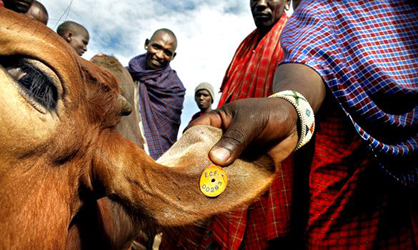
(Photo: James Glossop for The Times)
WilmerHale recently advised nonprofit organization GALVmed in setting up a manufacturing and distribution chain for a vaccine that can save the lives of cattle relied upon for food and economic security by farmers and herders in Tanzania. An event celebrating the successful registration of the vaccine with the Tanzanian government was held in the city of Arusha on May 20.
“This was an opportunity to assist people who really need help,” says Corporate and Technology Transactions & Licensing Partner Fred Server, who led the WilmerHale pro bono team. “It was also a great way for our attorneys to honor the firm’s longstanding commitment to pro bono legal service.”
Based in Scotland, GALVmed—the Global Alliance for Livestock Veterinary Medicines—works to make livestock vaccines, diagnostics and medicines accessible and affordable to the millions of people for whom livestock is a lifeline. It is funded by the Bill & Melinda Gates Foundation and the UK Department for International Development.
For several years, GALVmed has been working with a vaccine for a disease called East Coast fever (ECF), which is transmitted by ticks and kills one million cattle each year—about one cow every 30 seconds—in eastern, central and southern Africa. The organization needed the firm’s advice with a project that aimed to make the ECF vaccine more widely available to those who needed it in Tanzania.
“Losing these animals to East Coast fever jeopardizes the well-being of poor livestock keepers and their families,” says Server. “The survival of their animals means they can sell some and use that money to obtain medical care for themselves and their herd, and send their children to school. Milk yields are also important to the women in feeding the family and being able to buy clothes and other essentials. If their animals die, they are unable to obtain these basic needs.”
The firm first became involved in the project when Server was contacted in the fall of 2008 by Dr. Sara Boettiger, an agricultural economist at the University of California, Berkeley, who serves as the managing director of a nonprofit organization called the Public Intellectual Property Resource for Agriculture (PIPRA). PIPRA, another GALVmed advisor, works to make it easier for developing countries to access new technologies, specifically addressing intellectual property obstacles. Boettiger was referred to WilmerHale by a visiting law professor at Berkeley who was a former associate at the firm.
“Often, the parties that are involved in getting better technologies to the very poor don’t have either the resources or the capacity to address intellectual property issues,” says Boettiger. “They are working on many different pieces: the science and engineering, the communities, the actual delivery, the politics. But the legal side—intellectual property rights issues and contractual issues—turns out to be a barrier.”
Boettiger put GALVmed in touch with WilmerHale, which advised GALVmed on developing a strategy that would ensure that the vaccine—which is relatively inexpensive for those who own cattle—reaches not only wealthy dairy farmers, but also the poor farmers and herders who need it most. The vaccine is an “infect-and-treat” method of immunizing cattle, which involves infecting the animals with ECF and treating them with an antibiotic at the same time. When the vaccine is given, animals are also de-wormed, which aids their immune response, and tagged behind their ears. The presence of the ear tag nearly doubles the value of the animal when it is sold.
Most important to the project was the creation of an operation that was sustainable—unlike previous access to the vaccine, which was intermittent and unreliable. “The work that WilmerHale did in creating a legal framework for the necessary production and distribution relationships reversed that trend,” Steve Sloan, chief executive of GALVmed, wrote in a letter of thanks to the firm. “By tackling what had seemed impossible, we (yourselves, PIPRA and GALVmed) have shown that there is hope, not just for ECF, but for any disease, of achieving sustainable access for poor farmers to quality animal health vaccines and medicines.”
Server traveled to Tanzania with his wife Judith in January 2009 to see the situation firsthand. After several missed flights and a bumpy three-hour drive accompanied by a liquid nitrogen tank full of vaccine doses, they arrived at a small clearing where the vaccine was administered. “Nowadays, the Masai pastoralists have cell phones, so they can call to let each other know the vaccine has arrived,” he says.
On May 20, a celebration of the vaccine’s approval by the Tanzanian government—a process akin to FDA approval in the United States—was held in Arusha. In the welcome address, Sloan acknowledged WilmerHale’s valuable contribution to the project. A roundtable discussion also took place regarding the next steps for the vaccine. The goal is to expand its availability into Kenya, Uganda and Malawi, where ECF also ravages livestock.
This matter provided a chance for Server and his colleagues in the Technology Transactions & Licensing Practice to use their expertise in a pro bono case. Other WilmerHale attorneys who have been involved include Partners John Sigel, David Bassett and Jane Love, Senior Associate Jerry Marr and Associate Mehdi Ansari. Former WilmerHale attorneys Allison Noullet May, Jorge Contreras and Nader Mousavi also contributed.
“It’s difficult for our group to find the right opportunity to do meaningful pro bono work,” says Server. “Here, we did something really worthwhile, while allowing members of our practice group to rely on their transactional experience.”
For its part, GALVmed was grateful for the firm’s assistance. Sloan’s letter concluded: “Please accept and convey our sincere and heartfelt thanks to the pro bono board for the invaluable service that WilmerHale has given us and, through us, to the poor livestock keepers of Africa.”